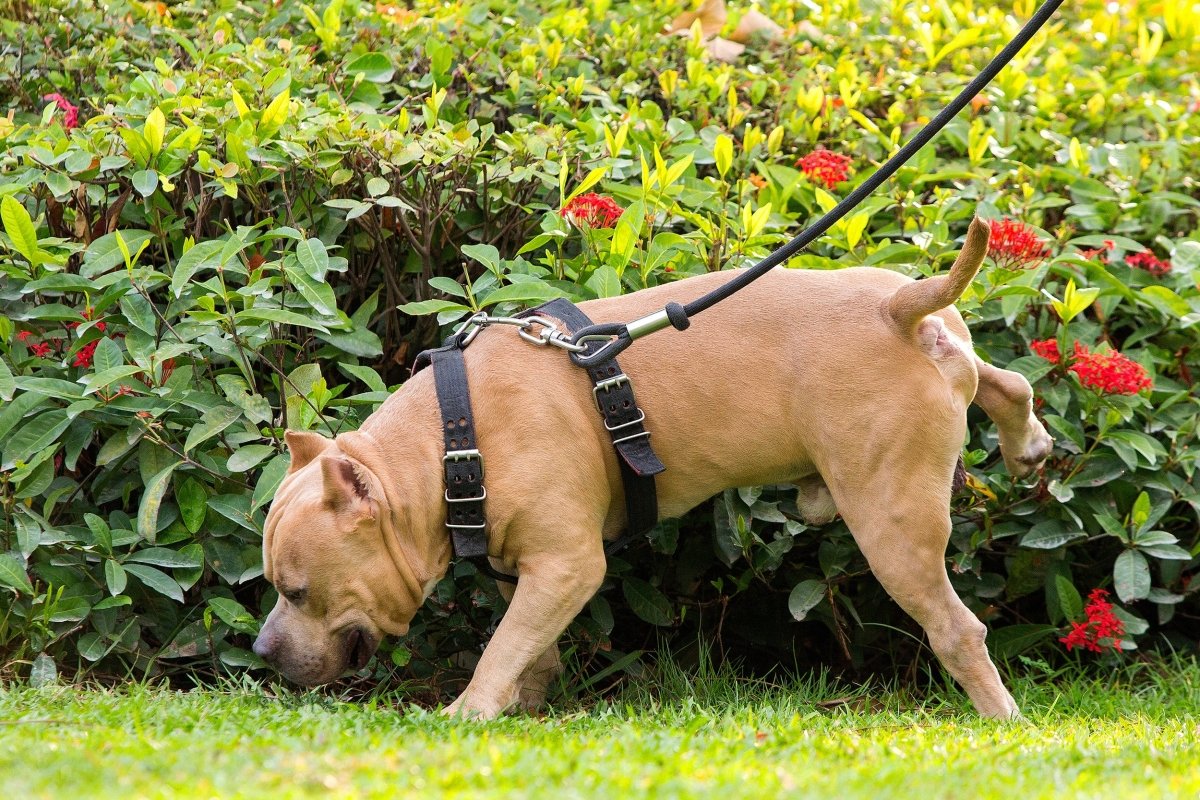When pet owners notice that there is blood in their dog's urine, the initial shock is great - after all, we always associate blood with serious injuries or illnesses. If you notice blood in your dog's urine, you should nevertheless remain calm, keep a close eye on your furry friend and take him to the vet as soon as possible. The vet will quickly identify the causes of bloody urine in your dog and treat it accordingly.
You can find out here which triggers can be responsible for the red coloration or blood in your dog's urine and what you should do if your four-legged friend suffers from urinary tract problems of this kind. In order to protect your dog's immune system and natural defenses, you should always make sure they eat a balanced, wholesome and natural diet. AniForte dog food contains selected ingredients in the ideal composition to protect your dog from diseases such as inflammation, infections and the like. The right diet can prevent blood in the urine in dogs.
Is blood in urine an emergency in dogs?
As bloody urine in dogs is a symptom and not a disease in itself, the above question cannot be answered in general terms. In any case, dogs with blood in their urine are an abnormality that should be investigated by an expert.
So that you can give your vet as much information as possible about your dog with blood in the urine, you should observe your furry friend closely and take a urine sample in advance, which can be examined in the laboratory. There are often accompanying symptoms that could give the vet an indication of an underlying illness. These are for example
- Frequent urination / urinating in the home
- Infrequent urination / pain when urinating
- Licking in the genital area
- Urine smells unpleasant or changed
- Fatigue / withdrawal
- Strong / reduced thirst
- Dog has a fever / high temperature
5 possible causes of blood in urine in dogs
The causes of blood in your dog's urine are varied. Basically, not only all organs of the urinary tract, but also the reproductive organs in dogs can be responsible for blood in the urine or the red coloration of the urine. For this reason, it is extremely important to have a professional diagnosis made by a vet instead of acting on your own initiative and giving the animal home remedies and medication.
As an immune deficiency is usually the cause of blood in the urine, certain natural feed supplements can be given in consultation with the vet. With the AniForte starter pack L, your four-legged friend can try out our most popular products. The included MultiVETAL Powder contains all the important vitamins to support your dog's recovery from blood in the urine, stimulate the metabolism and prevent bloody urine in dogs.
- Inflammation of the renal pelvis or bladder
Bacterial infections of the urinary tract are probably the most common, but initially quite harmless, cause of blood in the urine in dogs. As with us humans, dogs can also develop cystitis, which leads to bloody lesions in the bladder. If blood can be seen in the dog's urine, the bladder infection is often already advanced and should be treated by a vet as soon as possible.
To prevent blood in your dog's urine, you should correctly interpret the signs of cystitis; these include a constant, sometimes painful urge to urinate, during which your dog often only passes small amounts of urine. If the bladder inflammation is treated with an antibiotic at an early stage, you can also prevent it from developing into kidney or renal pelvic inflammation.
If your dog frequently suffers from immune-related bladder and kidney inflammation, our AniForte rosehip powder with vitamin C can support your dog's immune system and support the stability of the red blood cells.
- Urinary stones
Similar symptoms to cystitis are also associated with urinary stones in dogs; these are not only painful and cause blood in the urine in dogs, but can also be dangerous if not treated. The small crystals can become lodged in the entire urinary tract, block the urinary tract and ensure that your dog can no longer urinate - as a result, the urine builds up, which can have unsightly consequences.
As urinary stones are often caused by an incorrect diet with too much calcium, phosphorus or magnesium and too little water intake, you should pay attention to the composition of your four-legged friend's food as a preventative measure. To reduce these risk factors for the formation of urinary stones, you can, for example, switch to AniForte wet dog food or mix our natural dry food with water.
- Tumors in the lower urinary tract
Anyone who hears the word "tumor" is often very worried. Perhaps you also think that tumors always have to do with the proliferation of malignant cancer cells. Although this is not impossible, in most cases it is a simple proliferation or growth that occurs with advancing age throughout the urinary tract and in the reproductive organs and can cause blood in the dog's urine.
The vet will order an ultrasound and cystoscopy to identify tumors and treat them with appropriate medication. Surgery may even be necessary to treat blood in the urine in dogs.
- Injuries to the urinary tract or reproductive organs
Blood in the urine in dogs is usually caused by sores due to urinary stones, inflammation or tumors in the animal's urinary tract. However, injuries to the upper and lower urinary tract and the animal's reproductive organs can also occur as a result of external influences, i.e. trauma - such as a traffic accident, sexual intercourse or other violent influences - causing dogs to have blood in their urine.
These bleedings should also be examined by a vet to determine the severity of the injury, administer painkillers, stop blood in the urine with medication and prevent infection of the wound with antibiotics.
- Prostate diseases in male dogs
Prostate diseases are also a common cause of blood in the urine in dogs; more specifically in male dogs - usually unneutered - as bitches do not have this organ. The vet can find out exactly which prostate disease is present by rectal palpation.
To promote your dog's natural bladder and prostate function, stimulate digestion and support the immune system, you can mix our AniForte Bladder Formula powder into their food as a preventative measure. This consists of purely natural ingredients such as pumpkin seed flour, yarrow and other herbs.
Dog has blood in its urine, is this the wrong diagnosis? Other reasons for red coloration
Do you think your dog has blood in its urine because you have observed a red coloration? In most cases this is true, because there are many different causes for dogs with blood in their urine, which we have already mentioned. However, if your dog has previously eaten a lot of beet or other vegetables with a strong red color, the urine may also be temporarily pink to reddish in color.
If you can make sure that your dog has eaten these vegetables, that he otherwise shows no accompanying symptoms and that the urine was only temporarily red, there is no need to worry in this case! Nor do you need to worry if your dog is in heat; here too, blood in the urine is completely normal. However, if you are unsure, always visit the vet first.
Dog has blood in its urine: what you should do now
If your dog has blood in its urine, you should definitely visit the vet - if there are severe accompanying symptoms such as acute pain, high fever, pale mucous membranes or a hard abdomen, you are also in the right place at the emergency service! To bridge the time and at least not worsen your dog's condition, there are also a few tips that you can implement yourself.
Firstly, make sure that your dog with blood in its urine takes in enough water and can excrete it again at very regular intervals. If your dog doesn't like to drink much, you can also carefully help him with a syringe or give him water with his food. In the event of a possible bladder infection, it is also advisable to give your dog a warm place where he can rest. The cold floor or wet fur could make the symptoms worse.
In terms of nutrition, you can also add some cranberry juice to the water; this is said to have a positive effect on inflammation of the urinary tract. In the long term and if your dog often has blood in his urine, you should also talk to your vet about supplements for dogs or a change in diet - a diet is strongly recommended, especially for dogs with kidney disease.



